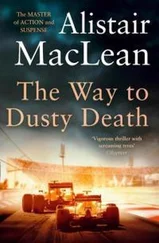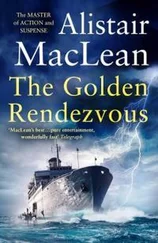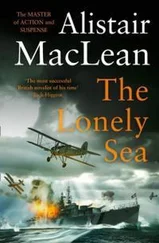All this I had known; but knowing and seeing weren’t the same things at all.
A hand touched my arm and I jumped. I had quite forgotten where I was.
‘What do you think of him, Mr Talbot?’ It was the skipper. ‘You like, eh?’
‘Yes. It’s nice. How much did this little toy cost? Any idea?’
‘Four million dollars.’ Zaimis shrugged. ‘Maybe four and a half.’
‘A fair investment,’ I conceded. ‘Four million dollars.’
‘Eight,’ Zaimis corrected. ‘A man cannot just come and start drilling, Mr Talbot. First he buy the land under the sea, five thousand acres, three million dollars. Then to drill a well – just one well, maybe two miles deep – it cost perhaps three-quarters of a million. If he’s lucky.’
Eight million dollars. And not an investment either. A gamble. Geologists could be wrong, they were more often wrong than right. General Blair Ruthven, a man with eight million dollars to throw away: what colossal prize could a man like that, with a reputation like his, be working for if he was prepared, as he so obviously was prepared, to step outside the law? There was only one way of finding out. I shivered and turned to Zaimis.
‘You can get in close? Real close, I mean?’
‘All the way.’ He pointed to the near side of the vast structure. ‘You have seen the ship tied up alongside?’
I hadn’t but I could see her now, a lean dark shape maybe two hundred and fifty feet long, completely dwarfed by the massive rig, the tips of her masts reaching no more than halfway up to the platform deck of the oil rig. I looked back at Zaimis.
‘Is that going to queer our pitch, John?’
‘Get in our way, you mean? No. We make a wide curve and approach from the south.’
He touched the rudder and the Matapan swung away to port, heading to bypass the X 13 to the south: to have gone to the north, the right, would have brought the Matapan under the glare of the arc and floodlights that illuminated the big working platform round the derrick. Even at a mile we could clearly see men moving around the derrick and the subdued hum of powerful machinery, like that of diesel compressors, came at us clearly over the darkened waters. So much, at least, was in our favour; it had not occurred to me that work on those mobile rigs would go on twenty-four hours a day but at least the clamour of their operations would drown out the throaty whisper of the Matapan’s engines.
The boat had begun to corkscrew violently. We were quartering to the south-west, taking that long, deepening swell on our starboard bow and water was beginning to break over the sides of the boat. And I was getting wet. I crouched under a tarpaulin near the rudder, lit a last cigarette under cover and looked at the skipper.
‘That ship out there, John. What chances of it moving away?’
‘I don’t know. Not much, I think. It is a supply and power ship. It brings out food and drink and mud for the drills and thousands of gallons of oil. Look closely, Mr Talbot. It is a kind of small tanker. Now it brings oil for the big machines, and perhaps electricity from its dynamos. Later, when the strike comes, it takes oil away.’
I peered out under a corner of the tarpaulin. It did look, as John said, a kind of small tanker. I had seen the same type of ship years ago in the war; the high, raised, bare centre-deck and after accommodation and engine-room of the inshore fleet oiler. But what interested me more right then was John’s statement that it was there most of the time.
‘I want to go aboard that ship, John. Can do?’ I didn’t want to go aboard, but I knew I had to. The idea of a vessel more or less permanently moored there had never occurred to me: now that I knew it to be a fact it was suddenly the most important factor in my considerations.
‘But – but I was told you wanted to go aboard the rig itself, Mr Talbot.’
‘Yes. Perhaps. But later. Can you manage the ship?’
‘I can try.’ Captain Zaimis sounded grim. ‘It is a bad night, Mr Talbot.’
He was telling me. I thought it was a terrible night. But I said nothing. Still angling south-west, we were passing directly opposite the middle of one of the long sides of the rig and I could see that the massive steel columns supporting the derrick platform were not so symmetrically arranged as I had imagined. Between the fourth and fifth of the huge legs, on either side, was a gap of perhaps a hundred and fifty feet and here the platform was scooped out to a much lower level than the main deck. On this lower level the thin spindly cigar-shaped outline of a crane reached up as high as the topmost level of the columns: the ship was moored directly below this cut-out well-deck, spanning the gap and a couple of steel pillars on either side of the gap.
Five minutes later the skipper changed course until we were heading due west again, in a direction that would have taken us clear to the south of the rig, but we had hardly time to get accustomed to the comparative comfort of heading straight into the swell when he put the helm over again, and headed north-west. We steered straight in, as it seemed, for the most southerly leg on the landward side of the rig, passing within forty feet of the bow of the ship moored alongside, scraped by the leg with only feet to spare and so found ourselves directly under the massive platform of the oil rig.
One of the young Greeks, a black-haired bronzed boy by the name of Andrew, was busy in the bows, and as we passed right under the platform and came abreast of the second pillar from the south on the seaward side he called softly to John and at the same time threw a lifebelt, attached to a coil of light rope, as far as he could to one side. As he did so John cut the engine to the merest whisper, and the Matapan , urged by the swell, drifted slowly back past one side of the pillar while the lifebelt came back on the other, so passing the light line completely round the pillar. Andrew picked up the lifebelt with a boat-hook and started pulling in the grass line which had been bent on to a heavier manila: within a minute the Matapan was securely moored to the pillar, with the engine just ticking over sufficiently to give her enough way to take the strain of the rope so that she wouldn’t snag too heavily in the steadily deepening swell. Nobody had heard us, nobody had seen us: not, at least, as far as we could tell.
‘You will be very quick,’ John said softly, anxiously. ‘I do not know how long we shall be able to wait. I smell the storm.’
He was anxious. I was anxious. We were all anxious. But all he had to do was to sit in that boat. Nobody was going to beat his head in or tie rocks to him and throw him into the Gulf of Mexico.
‘You’ve got nothing to worry about,’ I said reassuringly. Nor had he, compared to me. ‘Half an hour.’ I stripped off my overcoat, snapped the vulcanized neck and wrist cuffs of the tanned twill and rubber suit I was wearing beneath it, slipped an oxygen apparatus over my shoulders, tightened the straps, took the nose and eye piece in one hand and coat, pants and hat under the other arm and stepped gingerly over the side into the rubber raft the crew had already slipped over the side.
Andrew sat at the after end of this flimsy contraption, holding a line in his hand, and, as soon as I’d settled, let go his grip on the gunwale of the Matapan . The drift of the swell carried us quickly under the gloomy mass of the platform, Andrew paying out the line as we went. Paddling a rubber dinghy in a swell is difficult enough, paddling it in a specific direction against such a swell all but impossible: it would be a hundred times easier to regain the Matapan by hauling ourselves back hand over hand.
At a whispered word from me Andrew checked the rope and took a turn. We were now close up to the side of the ship, but still in deep shadow: the ship lay close in to the massive legs, but the platform overhung those legs, and so ourselves, by a good dozen feet, so that the angled light from the floodlights by the crane on the well-deck above barely succeeded in touching the faraway side – the port side – of the upper deck of the ship. All the rest of the vessel lay shrouded in deep darkness except for a patch of light that fell on the fo’c’sle from a rectangular gap high up in the overhang of the platform. Through this hole was suspended the vertical gangway, a zig-zag set of caged-in metal steps like a fire-escape, which, I supposed, could be raised or lowered, with the ebb and flow of the tide.
Читать дальше
Конец ознакомительного отрывка
Купить книгу












